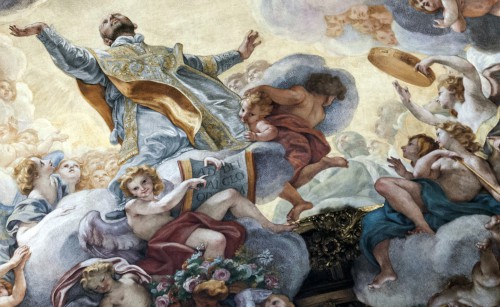
Earlier this week, the embassy co-hosted with the Pontifical Gregorian University – the university in Rome run by the Jesuits – an event to commemorate the bicentenary of the decision by Pope Pius VII to re-establish the Society of Jesus in 1814, 41 years after its suppression by Pope Clement XIV. This was much more than an historical event. The Jesuits continue to play a crucial role in the global Catholic Church, as they have since their foundation in 1540. As I noted in my brief speech, Jesuits have been at the heart of modern Catholic thinking, especially since the Second Vatican Council in 1965, leaders on ecumenism and freedom of religion, on poverty and indigenous rights, in educational and cultural developments. Not least, we have for the first time a Pope who was formed in the Jesuit tradition, and was the Jesuit Provincial Superior in Argentina during the 1970s.
Other speakers introduced us to the world of Ignatian spirituality and Jesuit history. Interestingly, it was the Catholic powers of Europe that pushed the Pope to suppress the Order, in the 18th century, while non-Catholic powers – Russia, Prussia and Britain – provided protection (both active and indifferent) during the 41 years out of favour. Stonyhurst College was established in Lancashire at that time, and Jesuits were able to teach and form a community there when it was forbidden for them to do so in Catholic Europe, while Heythrop College in London not long ago celebrated 400 years of continuous activity. This is rather an irony given the unwelcome reception given to Jesuit missionaries to England, Wales and Scotland, many of whom became martyrs, during the reigns of Elizabeth I and James VI and I. Whether 1814 saw restoration of the old Society of Jesus, or a new revival springing phoenix-like from the ashes, remains hotly debated by church historians.
Prejudices die hard. “Jesuitical” is a word still occasionally used in the English speaking world to describe people who dissemble or equivocate, and is defined as such in the Oxford English Dictionary. I have also heard it used as a synonym for cunning, even in describing the Pope. Jesuits are certainly taught to think clearly and systematically, and to reach decisions after careful discernment, which makes them formidable allies and tough opponents in an argument. Few Jesuits, least of all Pope Francis, will be dwelling on their history as they address contemporary realities with which they have to deal. But knowing where you have come from always helps an understanding of where you are going.
